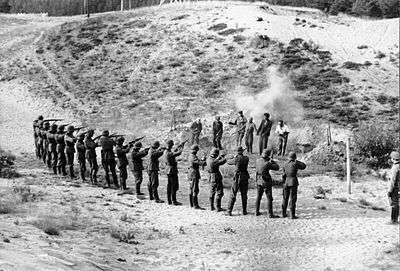Karl von Roques
| Karl von Roques | |
|---|---|
 Karl von Roques around the time of his trial, circa 1947 | |
| Born |
7 May 1880 Frankfurt am Main |
| Died |
24 December 1949 (aged 69) Nürnberg |
| Allegiance |
|
| Service/branch | Heer |
| Years of service | 1900–33, 1939–43 |
| Rank | General der Infanterie |
| Battles/wars | |
Karl Jerome Christian Georg Kurt von Roques (7 May 1880 in Frankfurt am Main – 24 December 1949 in Nürnberg) was a German general and war criminal during the Second World War, who was sentenced to 20 years imprisonment in the High Command Trial.
Early life
Karl von Roques was born in a German noble family of Huguenot descent. The family had emigrated to Germany to escape Louis XIV of France’s persecution of the French Protestants. Von Roques entered the German Imperial Army in 1899 as an ensign in the Infanterie-Regiment „von Wittich“ (3. Kurhessisches) Nr. 83. In 1900, he was promoted to lieutenant. From 1908 to 1911 he was attached to the Prussian Military Academy. In April 1912, von Roques was transferred to the German General Staff, where on 1 April 1914 he was promoted to captain.
When the First World War started, von Roques was attached to the staff of the VIII Reserve Corps with which took part in the campaigns of the Western Front. In 1915, he was transferred to the staff of the 8th Ersatz Division and in 1916 he became a staff officer in the 215th Infantry Division. In 1917 von Roques served in the Ministry of War. By the end of the war he had been promoted to major.
After the armistice, von Roques remained in the 100,000-man-strong Reichswehr, serving further in the war ministry. In October 1921, he was transferred to the staff of the 2nd Division near Stettin. In October 1923 von Roques was given command of the 2nd battalion in the 13th Infantry Regiment. Promoted to lieutenant-colonel in 1927 and colonel in 1928, von Roques was given command of the 16th Infantry Regiment stationed in Oldenburg. In May 1931, von Roques was promoted to major-general and given a command in Allenstein. Because of regulations which limited the number of general officers, von Roques was pensioned off in 1933 with the rank of lieutenant-general. On 1 August 1934, Karl von Roques became vice-president and chief of staff of the Reichsluftschutzbund. By 1936, von Roques had become its president. In October 1938 von Roques was recalled to active duty and in the Luftwaffe with the rank of lieutenant-general. In June 1939, von Roques left the Luftwaffe with the rank of General der Flakartillerie.
Second World War
During the Second World War, Karl von Roques served as an active officer in the Wehrmacht. In December 1939, he was given command of the new 142nd Infantry Division. From 15 March 1941 to October 1941, he was commander of the rear areas of Army Group South. On 1 July 1941, von Roques was promoted to General der Infanterie.

As commander of the rear areas, von Roques carried out a harsh policy against the partisans, Russian population and Jews. In October 1941, von Roques was transferred to the Führerreserve. In June 1942 he was again given command of the rear areas of Army Group South, and after the dividing of the army group in Army Group A and Army Group B, he commanded the rear areas of the former. On 1 January 1943, von Roques was again placed in the Führerreserve and on 31 March 1943 he was again pensioned off. In August 1943 he went to Warschau as a representative of the German Red Cross but he returned home after a couple of weeks. After the destruction of his house in Berlin by an air bombardment, he moved to Oberurff.
After the capitulation, von Roques was arrested and tried in the High Command Trial. He was sentenced to 20 years imprisonment. Moved for reasons of bad health from the prison in Landsberg am Lech to a hospital in Nürnberg, he died there on 24 December 1949.
References
Sources
- Jörn Hasenclever: Wehrmacht und Besatzungspolitik in der Sowjetunion : Die Befehlshaber der rückwärtigen Heeresgebiete 1941–1943. Schöningh, Paderborn 2010. ISBN 978-3-506-76709-7.
| ||||||||||||||||||
|